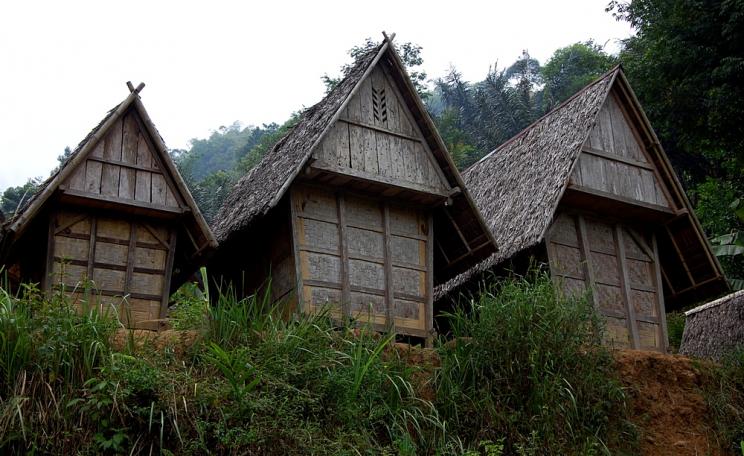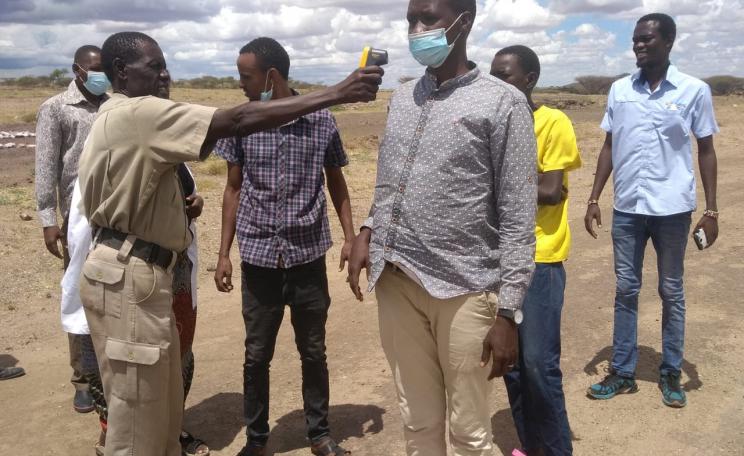It was immediately apparent that "these weren’t Covid-19 problems", these problems already existed and no one was interested in a short-term solution.
Saying ‘wash your hands for twenty seconds with hot water and soap’ is impossible when you don’t have a tap; saying ‘stay at home’ is impossible when you live in poverty, in crowded houses, or live with violence and abuse, or when you have no data, air time or food in your larder. It is physically impossible.
Accordingly, there was a massive rebuttal from South Africa’s marginal and poor communities when Cyril Ramaphosa announced lockdown measures. They criticised these measures announced by those with middle or upper class interests that didn’t consider the working class.
Originally, the government had planned to use food depots, local NGOs and community bodies to distribute food packages to vulnerable households. They have not managed to mobilise that system even yet.
Information
I spoke to Theresa Wigley, who works together with a group of individuals and organisations at Amava Oluntu creating learning experiences that bridge divides, and using participatory video and other techniques to tackle food scarcity.
Theresa noted that "the word on the street was that you could dial this 203 number and you could request food support" that would be delivered to your door. This led to an influx of desperate people applying to this ‘miraculous’ support, which never materialised.
This highlights the food insecurity threatening some South Africans, and more so the damage of disinformation. A large part of Theresa’s daily work has become refuting fake news: "It is so dangerous and has been the source of so much violence". Creating community-led information networks is particularly important now in providing access to information and in facilitating community-led solutions
At the beginning of this year, Amava Oluntu started a programme working with eight youths from around Cape Town, developing communication and the ability to help their peers use participatory video confidently.
Amava Oluntu was trained in participatory video in 2018 by InsightShare, and joined our growing global network of grassroots video hubs. We immediately saw the potential of the methodology to bring disparate groups together in an act of "social fermentation".
Resources
The youth group had a couple of meetings, but when lockdown happened they moved all of their interactions online. Theresa described how they adapted their process to respond to what was going on: the group were active in discussing what lockdown and Covid-19 meant.
Three members of the group are from Vrygrond, a community neighbouring on Muizenberg. One member asked if they could add people from their community to the group because they didn’t have access to this information or know anything about Covid-19.
It was immediately apparent that "these weren’t Covid-19 problems", these problems already existed and no one was interested in a short-term solution.
Just before lockdown began, the group used WHO posters to spread awareness about Covid-19, but this mode of information-sharing did not prove effective. Although Theresa noted that people would stop and engage in conversation while these posters were being put up, the scale required for mass distribution and engagement was not there.
Whatsapp and Facebook are far more effective, but data is again a huge issue. Theresa put pressure on big telecommunications firms to provide free data, but this was unsuccessful and led her to pay for data herself.
In an earlier piece, Theresa wrote, ‘South Africa has been designed to maintain the vast inequality of access and resources fostered under apartheid’. In Muizenberg, this is upheld by railway tracks, where those on one side are privileged and those on the other not.
Community
This kind of inequality, food insecurity and poverty is felt in Vrygrond too, and particularly now in the current pandemic. A lack of information and resources leaves this community vulnerable: some think the greater danger is starvation, not COVID-19.
Working with this group of youth, Theresa helped create a community Whatsapp group that immediately took off. Some 42,000 people live in Vrygrond, and so the group became a space for people from all intersections of the community to express their concerns.
But it was immediately apparent that "these weren’t Covid-19 problems", these problems already existed and no one was interested in a short-term solution. The group wanted to create a long-term solution that would address critical issues, using the urgency and leverage thrown up by the pandemic to create changes that should have happened a long time ago.
Theresa began to identify strong voices who wanted to speak about solutions and created a new group, primarily made out of youth. Using community mapping - a participatory technique - this new group mapped the whole Vrygrond community: resources, means, people and needs.
Visualising the community and its needs using maps, they were able to bring together representatives from each part of the community and delegate responsibility to them.
Kitchens
As resources were identified, they were put on the map. Some such resources were community kitchens, which feed adults and children. It was decided that more kitchens should be constructed to: reduce crowding and allow better social distancing, reduce travel for food, and increase security for community members who need food.
There are now 22 kitchens (up from 12) running in Vrygrond. They provide essential food and also essential hubs of communication: here people can share a meal and important news related to Covid-19.
Theresa said: "The kitchen is the heart of the home. These kitchens are the heart of their community: they are the one place that people are going to come to every day, and so they become very powerful places to communicate information."
These kitchens also offer a vision of the future. The group that created these kitchens imagine them emerging from the pandemic as sites of knowledge and skills sharing. This looks towards long-term solutions that change the position of people in Vrygrond, borne out of community care and ownership.
Individuals and organisations like Amava Oluntu are trying to ensure that knowledge and resources are being transferred across the divides to ensure that communities are able to practice change that they want - not what someone else wants. Amava Oluntu joins the host of InsightShare hubs fighting for this kind of representation.
Future
Theresa closed by noting that "it has been really important for the Vrygrond group to see the world pay so much attention to problems that are everyday for them.
"I can’t speak for them, but I guess that the dream is that this level of attention can bring to light a lot of what needs to change, before, during and long after Covid is around."
This means policy change, but also support between neighbouring communities: "Muizenberg should always be transferring knowledge, skills and materials. We need to level the playing field, and if these relationships are built properly, there’s no reason we can’t."
This Author
Grace Hutchison is the programme development officer at InsightShare. Grace manages pathways of learning and exchange across the network, working closely with InsightShare’s participatory video hubs. This article is part of InsightShare's COVID-19: Indigenous Insights campaign.
Image: Isabel Corthier.





